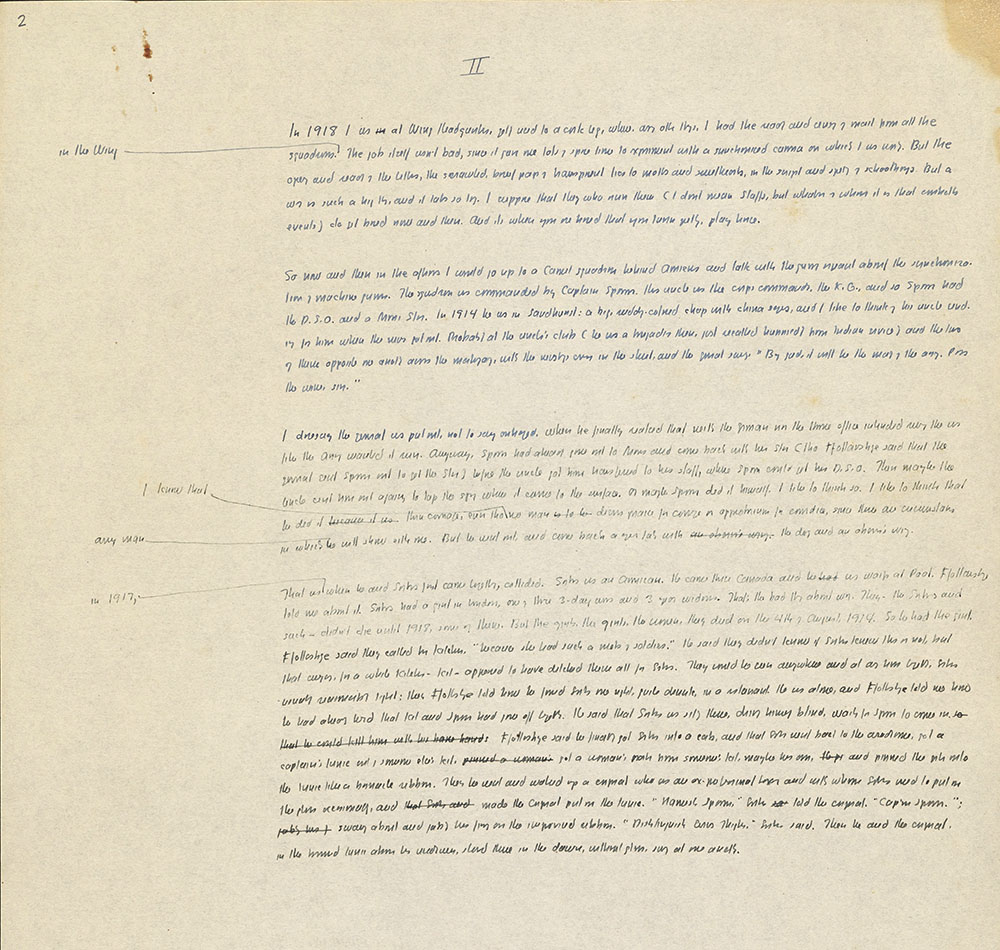TRANSCRIPTION
II
In 1918 I was <in> at Wing Headquarters, getting used to a cork leg, where, among other things, I had the reading and censoring of mail from all the
squadrons.
[margin: in the Wing]
The job itself wasn't bad, since it gave me lots of spare time to experiment with a synchronized camera on which I was working. But the
opening and reading the letters, the scrawled, brief pages of transparent lies to mothers and sweethearts, in the script and of schoolboys. But a
war is such a big thing, and it takes so long. I suppose that they who run them (I dont mean staffs, but whatever or whoever it is that controls
events) do get bored now and then. And its when you are bored that you turn petty, play horse.
So now and then in the afternoon I would go up to a Camel squadron behind Amiens and talk with the gunnery sergeant about the synchroniza-
tion of machine guns. The squadron was commanded by Captain Spoomer. His uncle was the corps commander, the K.G., and so Spoomer had
the D.S.O. and a Mons Star. In 1914 he was in Sandhurst: a big, ruddy-colored chap with china eyes, and I like to think of his uncle send-
ing for him when the news got out. Probably at the uncle's club (he was a brigadier then, just recalled hurriedly from Indian service) and the two
of them opposite one another across the mahogany, with the newsboys crying in the street, and the general saying, "By gad, it will be the making of the army. Pass
the wine, sir."
I daresay the general was put out, not to say outraged, when he finally realized that neither the German nor the Home office intended running the war
like the Army wanted it run. Anyway, Spoomer had already gone out to Mons and come back with his Star (tho Ffollansbye said that the
general sent Spoomer out to get the Star) before the uncle got him transferred to his staff, where Spoomer could get his D.S.O. Then maybe the
Uncle sent him out again, to tap the spring where it comes to the surface. Or maybe Spoomer did it himself. I like to think so. I like to think that
he did it <because it was> thru courage, even tho
[margin: I know that]
no man <is to be> deserves praise for courage or opprobrium for cowardice, since there are circumstances
in which <he>
[margin: any man]
will show either one. But he went out, and came back a year later with <an observer's wing.> the dog and an observer's wing.
That was
[margin: in 1917,]
when he and Sartoris first came together, collided. Sartoris was an American. He came thru Canada and he <had> was waiting at Pool. Ffollansbye
told me about it. Sartoris had a girl in London, one of those 3-day wives and 3-year widows. That's the bad thing about war. They – the Sartorises and
such – didn't die until 1918, some of them. But the girls, the girls, the women, they died on the 4th of August, 1914. So he had the girl,
Ffollansbye said they called her Kitchener, "because she had such a mob of soldiers." He said they didn't know if Sartoris knew this or not, but
that anyway, for a while Kitchener – Kit – appeared to have ditched them all for Sartoris. They could be seen anywhere and at any time together, Sartoris
usually [remarkably?] tight; then Ffollansbye told how he found Sartoris one night, quite drunk, in a restaurant. He was alone, and Ffolansbye told me how
he had already heard that Kit and Spoomer had gone off together. He said that Sartoris was sitting there, drinking himself blind, waiting for Spoomer to come in. <so
that he could kill him with his bare hands> Ffollansbye said he finally got Sartoris into a cab, and that Sartoris went back to the aerodrome, got a
captain's tunic out of someone else's kit, <pinned a woman's> got a woman's garter from someone's kit, maybe his own. <He pi> and pinned the garter onto
the tunic like a barnacle ribbon. Then he went and waked up a corporal who was an ex-professional boxer and with whom Sartoris used to put on
the gloves occasionally, and <that Sartoris and> made the Corporal put on the tunic. "Namesh Spoomer," Sartoris <sai> told the corporal. "Cap'm Spoomer";
<jabbing his> swaying about and jabbing his fists on the improvised ribbon. "Dishtinquish Arses Thighs," Sartoris said. Then he and the corporal,
in the borrowed tunic above his underwear, stood there in the dawn, without gloves, swinging at one another.
|


